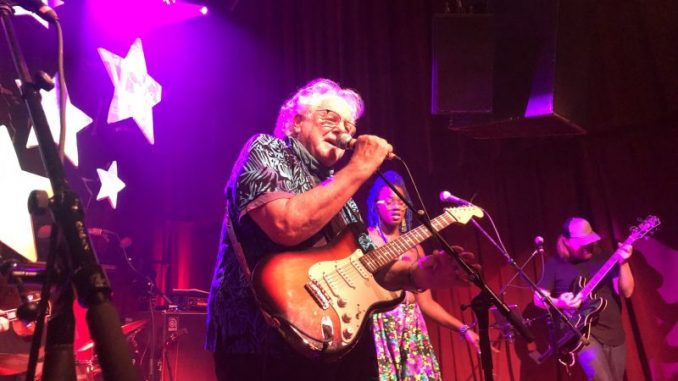
Unlimited Devotion is an annual event held in Pennsylvania’s Ardmore Music Hall to celebrate the music of the Grateful Dead and to raise funds for the Rex Foundation. This sixth Unlimited Devotion included two impromptu “supergroups,” both fronted by Peter Rowan -Wavy Gravy All-Stars and Reggae Jerry, playing the music of the Dead. Occasional contributer to AUK, Mike Fiorito sent us this report of what seems to have been a unique marriage of jamband, bluegrass, cosmic American music and a dash of Peter Rowan led reggae.
Pythagoras said that “Physical matter is music solidified.” You might also say that music is the energy of physical matter released into the world. Maybe the first music on the Earth was the sound of exploding volcanoes, or the upsurge of layers of rock that finally soared into the sky as mountains. Like the wind, insects and animals gave the terrestrial world a softer music: birdsong, the twitter of mice.
Listening to the songs like ‘That’s It For The Other One’, ‘New Potato Caboose’ and ‘St. Stephen’ by the Grateful Dead, I imagine the Earth’s crust breaking, volcanoes erupting and the sky roaring with purple thunder. In part due to the experimental performances during the Acid Tests, The Grateful Dead made the studio and the live stage their laboratory, pioneering new recording and mixing techniques. Bill Graham said, tongue-in-cheek, of the Grateful Dead, “They’re not the best at what they do, they’re the only ones that do what they do.” Like John Coltrane and other jazz artists, Garcia began incorporating melodies derived from Indian ragas into the band’s extended, often psychedelic, improvisation, recalling the sitar music of Ravi Shankar.
We can’t understate the impact that the Grateful Dead’s music has had on subsequent generations, creating new genres of music. Bands like Phish, the Trey Anastasio Band and countless others, honour the spontaneity and creativity the Grateful Dead brought to Americana and rock music in general. The Grateful Dead also introduced different music to new audiences. Jerry Garcia’s playing with Old & in the Way spread the gospel of bluegrass to people like me from cities in America, and around the world. Mickey Hart’s Planet Drum introduced Giovanni Hidalgo from Puerto Rico and Zakir Hussain from India to new audiences. Performers like Hamza El Din opened Grateful Dead shows, exposing their music to audiences who might never have heard of them. We owe a great bow of gratitude to the Grateful Dead for this.
On June 2nd and 3rd, Ardmore Music Hall in Pennsylvania put on two nights of music inspired by the music and legacy of the Grateful Dead. The shows were titled ‘Unlimited Devotion’. I’m only covering the June 2nd show in this article. I had to get home the next day.
With performances by the Wavy Gravy all-stars and Reggae Jerry, both sets were fronted by bluegrass legend Peter Rowan, who played with Jerry Garcia in Old & in the Way and wrote many of the best songs they performed. In fact, songs like ‘Panama Red’ and ‘Midnight Moonlight’ became part of the Grateful Dead set list. I’d asked Rowan, “What can you say about the Grateful Dead’s contribution to the music of our time? And how has playing with Jerry Garcia impacted your songwriting and playing?” He replied, “Without García we would be musically impoverished, but Jerry would always point to our forebears: Ornette Coleman, the ska bands, gospel music, choral, symphony music and more. It’s all still there for us to find. Jerry had shown a great light on the path of musical inspiration.”
The Wavy Gravy all-stars consisted of Reed Mathis (Billy & the Kids); Jackie Greene (Phil Lesh & Friends); Daniel Donato & Dezron Douglas (Trey Anastasio Band); Mikaela Davis, Leslie Mendelson, and Johnny Kimock (Mike Gordon). Max Wareham, banjoist in the Peter Rowan Bluegrass Band, joined in on a few songs. There was a lot of firepower on that stage.
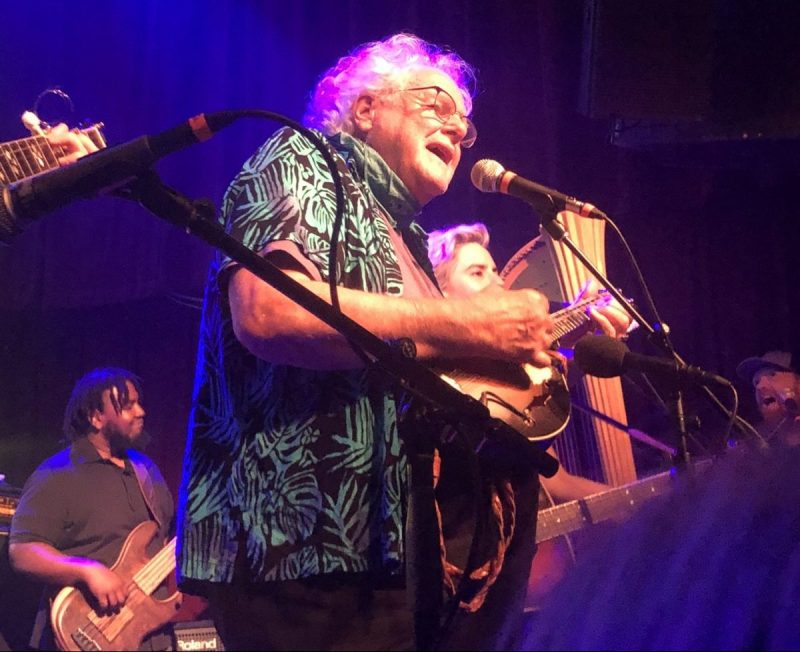
Rowan opened playing mandolin and singing a meditative version of ‘Moonlight Midnight’, setting the mood for the night. The crowd yelled things like “I love you, Peter Rowan,” as smoke billowed from the stage, curling up and dissolving into the light show. As I looked around, I saw Deadheads of all ages, men and women. A young woman came up to me as I was taking pictures near the stage and said she loved Peter Rowan. She might have been about twenty-five. “How do you know of Peter Rowan?” I asked. I was genuinely curious to know how she knew his music, being so young. “Old & in the Way,” she replied without hesitation. She was clearly a little stoned, but I was so impressed she knew her stuff.
Rowan then switched to a Fullerton Fender Stratocaster electric guitar and started playing ‘Sweet Melinda‘ from his ‘Texican Badman’ album, released in 1980. The guest musicians on this album include Jerry Garcia (steel guitar), David Grisman (mandolin), Flaco Jimenez (accordion), and Bill Kreutzmann (drums). Four of the songs were studio recordings from 1974, and the other six were recorded live in 1979. Along with ‘Sweet Melinda’, the standout tracks are ‘Four Corners/A Vacant Sea’, ‘Texican Badman‘, and ‘What of Alicia‘. Leslie Mendelson, who has collaborated with legendary musician Jackson Browne & the Grateful Dead’s Bob Weir, then introduced and beautifully sang Garcia’s ‘Lazy River Road‘, with harmony accompaniment from the Wavy Gravy All-Stars. This was followed by the Dead’s ‘Cumberland Mine‘, whipping up the audience into a frenzy. Almost completely hidden by her gigantic harp, Mikaela Davis sang the Dead’s ‘Mountains of the Moon‘, her playing reminiscent of the original tune, but sung in her gorgeously textured voice. An expert harpist, Davis is also a singer, songwriter, and multi-instrumentalist navigating folk, rock, and chamber pop.
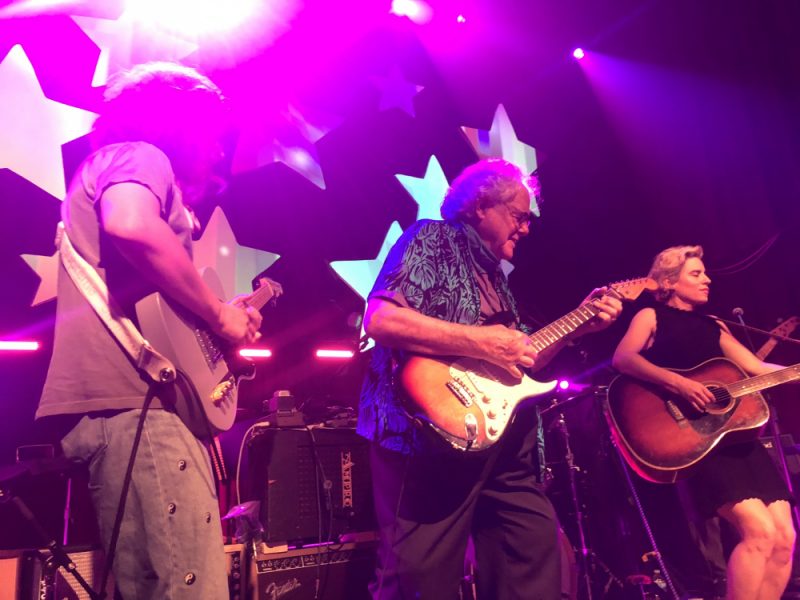
At the show’s break, medics rushed in to carry out someone from the audience to the hospital. They had apparently done too much of something and had plunked out on the floor. The Ardmore crew handled it professionally and swiftly. The security at Ardmore gave you the impression they were there to keep you secure, not to lord over you. I recalled how Wavy Gravy’s “Please Force” peacefully handled security at Woodstock. “Please don’t do that, please do this instead”
When the Reggae Jerry band took the stage, there was some personnel changes: the line up being Peter Rowan, Steve Kimock, Karl Denson, Reed Mathis (Billy & the Kids); Dezron Douglas, Ray Paczkowski, Russ Lawton (Trey Anastasio Band); Kanika Moore (Doom Flamingo); and Matt Butler (Everyone Orchestra). The entire band was great, although I have to say that Steve Kimock’s slide guitar playing was outstanding. He was very patient, accenting Rowan’s and Kanika Moore’s vocals. More to say on that in a bit.
Rowan and Kanika sang ‘Stir it Up’, ‘Rivers of Babylon’, ‘No Woman, No Cry‘ and ‘Sitting Here in Limbo‘. As this set was lathered into full gear, Rowan danced on stage, shimmying on his left and right foot. Although perhaps twice as old as some of the folks on stage, Rowan led the charge. I could tell that Rowan was spontaneously introducing call and response with Kanika Moore, perhaps surprising her a bit. Then Steve Kimock joined in the conversation, his bell tone notes harmonizing with Rowan’s and Moore’s voices. The group was in no rush to end these songs. Rather, Rowan lifted the band, taking both the band and the audience along with him to soaring heights.
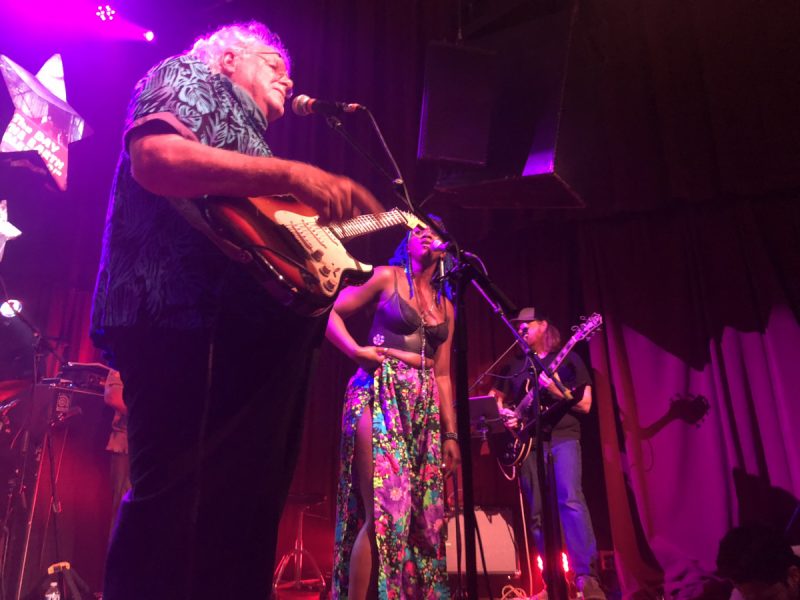
Rowan showed that his years of performing have given him grace. He knows how to capture a moment, to quiet his soul and make space for magic to happen. At one point, Rowan ululated above the music. If you listen to the song ‘Land of the Navajo‘, you’ll hear exactly what Rowan’s ululation sounds like. Ululation, from Latin ululo, is a long, wavering, high-pitched vocal sound resembling a howl with a trilling quality. It is produced by emitting a high-pitched loud voice accompanied with a rapid back and forth movement of the tongue and the uvula. In some cultures, the sound of ululation is mournful, while in others it is a heartful, even joyful, expression of emotion, praising warriors for acts of valour, for instance. Rowan’s voice was like a waterfall pouring into the ocean of sound the band played. As Rowan swayed in the light, I was reminded of how, in the Bhagavata Purana, Krishna performed his cosmic dance on the snake Kaliya (Nāga). Krishna had assumed the weight of the entire universe in his tiny feet and almost crushed the snake to death. But Krishna stopped after hearing the prayers of Kaliya’s wives. Like Krishna, Rowan danced with the weight of the cosmos on the audience, slaying us with his performance. Awakening from the trance of Rowan’s spell, I found myself standing in a column of light, reduced to a peaceful silence.
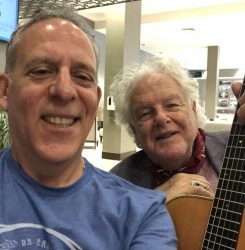
Later, I asked Rowan, “Why do you think you connect so intimately with reggae?” His response – “Reggae is a great mystery. Reggae comes from the calypso grooves, rock steady, and is ever evolving. There were two big influxes into the Calypso/Mento scene: Duke Ellington Orchestra and Fats Domino, both of whom played concerts in Jamaica. One appearance each. Ska horn players came out of that I believe. Under English rule, Jamaican students could obtain full high school study along with an auto mechanics or electrician’s degree. Trained musicians!”
When I left Ardmore Music Hall, I smiled, thinking that it’s fun to be around hippies. In their tie-dyes and fairy boots, they danced blissfully without a hint of self-consciousness. Everyone had a great time at that show. They cherished the music, the performers, and the live performance. It reminded me that music can always lift you and take you to places in the heart, releasing all that energy from physical matter, like perhaps nothing else can.
Mike Fiorito is an author and a freelance music reviewer. His book Falling from Trees won the 2022 Independent Press Distinguished Book Award. Mike’s latest book, Mescalito Riding His White Horse, Inspired by the Music of Peter Rowan, is available for sale now. For more information, please go to MikeFiorito.com


